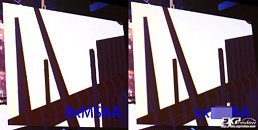Thursday, March 15th 2012

NVIDIA Introducing a New Anti-Aliasing Algorithm with Kepler?
Reliable sources indicate that NVIDIA could introduce a new anti-aliasing (AA) algorithm with its Kepler family of GPUs. There are already plenty of AA algorithms which have been introduced with recent generations of GPUs, including FXAA, which have enabled higher levels of image quality, while not being as taxing as MSAA. This leaves only one area in which a new AA algorithm can take shape: to raise the image quality bar higher, while lowering performance penalty.
In a screenshot, probably sourced from NVIDIA's GeForce Kepler press-deck, this new algorithm is compared to 8x MSAA, in which it appears to give superior image quality. We know that 8x MSAA can be taxing, the kind of image quality we're seeing with this mysterious AA algo 'looks' taxing with available technology, unless of course, NVIDIA developed a silver-bullet in its new algorithm, which provides stunning image quality while not being too taxing on the GPU's resources.
Source:
Expreview BBS
In a screenshot, probably sourced from NVIDIA's GeForce Kepler press-deck, this new algorithm is compared to 8x MSAA, in which it appears to give superior image quality. We know that 8x MSAA can be taxing, the kind of image quality we're seeing with this mysterious AA algo 'looks' taxing with available technology, unless of course, NVIDIA developed a silver-bullet in its new algorithm, which provides stunning image quality while not being too taxing on the GPU's resources.

39 Comments on NVIDIA Introducing a New Anti-Aliasing Algorithm with Kepler?
Although it must be said... FXAA > MLAA
:D
If Nvidia pulls something out of their green bag of goodies that is all they are saying I might be running green also.
video and IQ in games? shits pretty even, in the far past ati had clear advantages, but now it's sorta per game, per generation of gpu and per driver.
timothylottes.blogspot.com
There is also a 3rd method with lots of potential, called SMAA. You can find it here:
www.iryoku.com/smaa/
What i hope here is that NVIDIA will give possibility of using their nFXAA (see what i did there :D ) the same way as AMD does with their MLAA. So you can enable it for any game you want through drivers. Because injecting FXAA or SMAA into apps does work but is incompatible with any kind of multiplayer game that uses anti-cheat system. MLAA on the other hand is immune to this problem and can be freely used in ANY game.
Because if they do that, i'll seriously reconsider buying a Kepler based gfx card even though i have HD6950 at teh moment. And MLAA is great but i know it has limitations nicely shown by the SMAA guys in their tech video. On the other hand i won't consider Kepler in case if AMD can give us FXAA or SMAA along with existing MLAA just by Catalyst update. Because if they do, i'll have another reason to stick with Radeons. Yeah, this feature is that important for me, because there are loads of games ported from consoles and no one cares about adding some FSAA to them. NFS Hot Pursuit 2010 was one of such games and while many complained about the lack of any kind of FSAA, i just enjoyed it with MLAA and i still do. No jaggies at all thanks to MLAA in Catalyst.
So yeah, NVIDIA, bring it on. The more they offer such techniques, the better. So we, the customers have more options to chose from.
translate.google.com.ni/translate?js=n&prev=_t&hl=es&ie=UTF-8&layout=2&eotf=1&sl=es&tl=en&u=http%3A%2F%2Fwww.nicagamerz.com%2Fv6%2Fnews%2F363%2Fimplementacion-de-mlaa-en-amd-ayuda-bastante-a-los-juegos-de-pc-gracias-al-ps3%2F